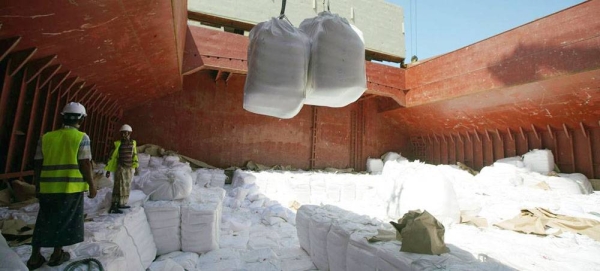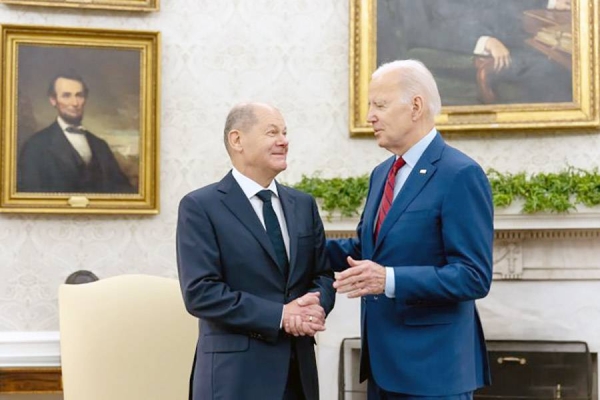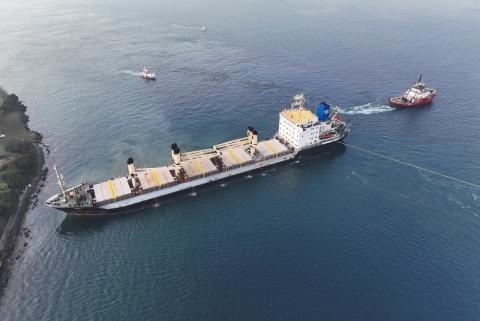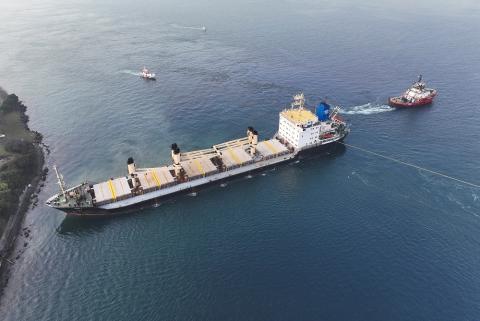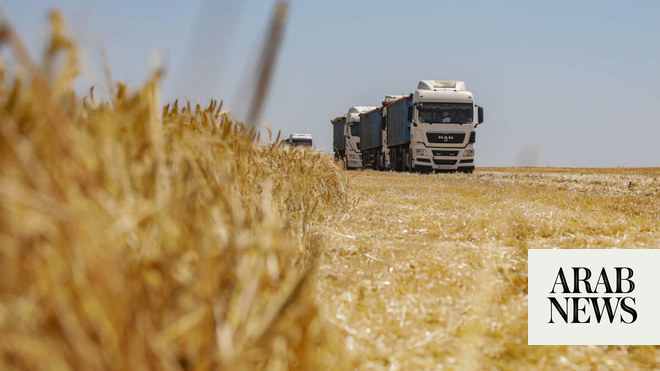
Russia’s foreign minister, Sergei Lavrov, has reassured Egypt over Russian grain supplies at the start of a four-country tour of Africa, amid uncertainty over the future of a deal to resume Ukrainian exports via the Black Sea.
Egypt, one of the world’s top wheat importers, bought 80% of its wheat from Russia and Ukraine last year, and has been torn between ties to Moscow and its close relationship to the west.
“We confirmed the commitment of Russian exporters of cereal products to meet their orders in full,” Lavrov said in Cairo after talks with his Egyptian counterpart, Sameh Shoukry. “We discussed … cooperation in this area, agreed on further contacts, and have a common understanding of the causes of the grain crisis.”
Russia’s 24 February invasion of Ukraine has massively disrupted grain shipments, with a blockade of Ukrainian ports by Russia’s Black Sea fleet trapping tens of millions of tonnes of grain, dramatically exacerbating existing supply chain problems.
Global commodity prices have soared, prompting the UN to say that an additional 47 million people are facing “acute hunger”. Many of the worst-affected countries are in Africa. Russia has blamed the blockade on Ukrainian mines.
Lavrov’s tour, which will also take in Uganda, Ethiopia and Congo, is aimed essentially at rallying African nations to Russia’s side. In an article published in four African papers, he rejected accusations that Russia was responsible for the food crisis.
He hailed what he called “an independent path” taken by African countries in refusing to join western sanctions against Russia and the “undisguised attempts of the US and their European satellites to gain the upper hand and impose a unipolar world order”.
The Russian foreign minister’s visit came as Ukraine warned that grain exports would not restart as hoped after the signing of a landmark deal aimed at easing the food crisis if a Russian airstrike on a key port on Saturday was a sign of things to come.
The attack, which the Ukrainian president, Volodymyr Zelenskiy, denounced as “barbarism” and as a sign that Moscow could not be trusted to implement the freshly inked deal, drew international condemnation.
Turkey, which helped broker the accord allowing exports to resume, said immediately after the double cruise missile hits on the strategic southern port that it had received assurances from Moscow that Russian forces were not responsible.
Advertisement
But Russia’s defence ministry said on Sunday the strikes had destroyed a naval vessel and arms delivered by Washington. Kyiv said two Kalibr missiles fired from Russian warships hit an area around a pumping station and that two more were shot down.
“High-precision, long-range missiles launched from the sea destroyed a docked Ukrainian warship and a stockpile of anti-ship missiles delivered by the US,” Moscow claimed. “A Ukrainian army repair and upgrade plant has also been put out of order.”
The strike, which Ukrainian armed forces said did not hit the port’s grain storage area or cause significant damage, cast grave doubts on the future of the deal, which allows Ukrainian grain ships to navigate safe corridors that avoid known mines in the Black Sea and was hailed on Friday as a diplomatic breakthrough.
Kyiv said preparations to restore grain shipments to their prewar levels of 5m tonnes a month were continuing, but Zelenskiy’s economic adviser, Oleg Ustenko, warned on Sunday that the airstrike “indicates it will definitely not work like that”.
Ustenko told Ukrainian television that Ukraine had the capacity to export 60m tonnes of grain over the next nine months, but it would take up to 24 months if its ports could not function properly.
Odesa is one of three designated export hubs under the deal brokered by the Turkish president, Recep Tayyip Erdoğan, and the UN chief, António Guterres, who presided over the signing ceremony on Friday and – along with the EU, US, UK, Germany and Italy – unequivocally condemned the attack.
The agreement in Istanbul has brought little reprieve on the battlefield. As the war entered its sixth month on Sunday, Russian forces continued to bombard a sprawling frontline over the weekend, Ukraine’s presidency said on Sunday.
It said that among the attacks in the industrial east and south, four Russian cruise missiles had hit residential areas in the southern city of Mykolaiv on Saturday, injuring five people, including a teenager.
The governor of the eastern Donetsk region, one of two that make up Ukraine’s industrial heartland of the Donbas and are a key focus of Russia’s offensive, said two civilians had been killed and two more injured in the last 24 hours.
The British defence ministry said on Sunday in its daily intelligence update that Russia was making “minimal progress” in its Donbas offensive, which it said remained small-scale and focused on the eastern city of Bakhmut.
The Ukrainian military again referred to Russian operations paving the way for an assault on Bakhmut, while heavy Russian shelling prompted the mayor of Kharkiv to urge people of Ukraine’s second largest city to avoid travelling overground.
“The last week has shown that the aggressor doesn’t even pretend to be firing at military targets any more,” Ihor Terekhov said on Sunday. “Use the metro system more often – as of today it is the safest way to get around.”
In more encouraging news from Kyiv, Serhiy Khlan, an aide to the head of the southern Kherson region, which fell to Russian forces in early March, told Ukrainian television on Sunday that it would be recaptured by Kyiv’s forces by September.
Helped by deliveries of western-supplied long-range artillery, Ukrainian forces have been clawing back territory in the southern Kherson region in recent weeks. “We see that our armed forces are advancing openly. We can say that we are switching from defensive to counteroffensive actions,” Khlan said.





